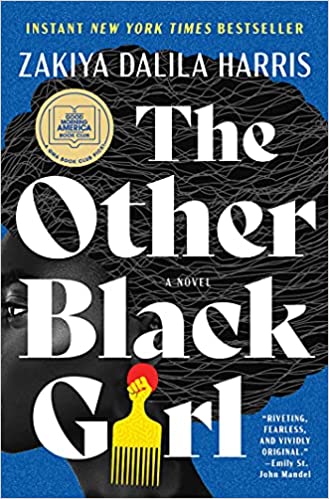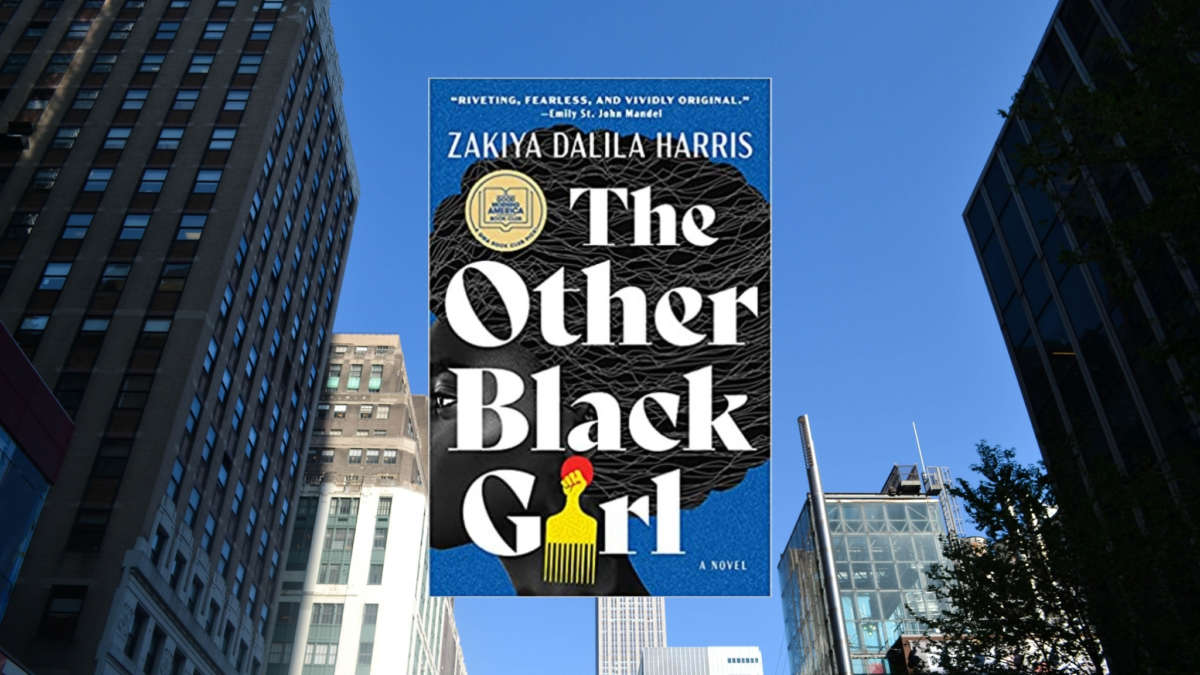The Other Black Girl by Zakiya Dalila Harris
In The Other Black Girl by Zakiya Dalila Harris (Atria), 26-year-old editorial assistant Nella Rogers loves her New York City publishing job. She has longed to become an editor at Wagner Books ever since reading their groundbreaking bestseller Burning Heart when she was a teenager. Nella’s dream has come true, except that she is the only Black woman on the staff. She feels isolated and disrespected by her co-workers, and her attempts to enlighten them about racial diversity prove futile — until one day something miraculous occurs.
Harlem born and bred Hazel-May McCall, a new Black editorial assistant, arrives on the scene. Hazel is beautiful, confident, outspoken, and socially conscious; all the things Nella is not, but nonetheless, Nella immediately senses a whiff of competition from her new colleague. Meanwhile, Nella becomes embroiled in a string of uncomfortable events that affect her credibility at Wagner.
When Nella questions the stereotypical portrayal of a Black character in an upcoming novel from Wagner’s bestselling author, both the author and Nella’s boss, Vera, are affronted. As retribution, Vera mentors Hazel, leaving Nella to question her identity within the company. To prove her worth to Vera, Nella buries herself in her additional assignments, to the detriment of her relationships with her live-in boyfriend, Owen, and her best friend, Malaika. Despite her efforts, Nella watches Hazel’s star rise while hers fizzles out.
But that is not the worst of it. Threatening notes appear on Nella’s desk, warning her to “LEAVE WAGNER NOW.” Who is responsible for the threats? Is it Hazel?
SECRETS AND THREATS WEAVE TOGETHER THE PRESENT AND PAST
Tension mounts as Nella is anonymously tipped off that Hazel is not who she pretends to be, and Nella sets out on a dangerous path to unmask her competitor. Cool-girl Hazel always seems to be one step ahead of Nella, and now Hazel’s apparent friendliness toward her (like exchanging hair care tips and party invitations) suggests a cover for darker hidden secrets. Drawn deeper into the mystery, Nella questions her own identity and whether her at Wagner is worth sacrificing her personal life for.
Intertwined with Nella’s story are vignettes detailing the catastrophic downfall of the editor, and mercurial rise of the author, of Burning Heart, a momentous book published by Wagner in the 1980s. It was the first number-one fiction bestseller written and edited by Black women. The pair were thick as thieves, but their legendary falling out remains the subject of office gossip and a mystery kept under wraps by the powerful owner of the publishing house.
That novel’s author found tremendous success after publication, while in contrast, the editor’s careless and racist remarks forced her to quit publishing and seek seclusion. The former childhood friends haven’t communicated in almost 30 years, and have remained polarized by an industry demanding compliance with the rules. Tying the subplot to the main story, Nella wonders whether she holds the key to locating the editor and reuniting the two women after all these years.
DRAWN INTO A SUSPENSE THAT ECHOS REALITY
On every page, the reader is drawn into the suspense of uncovering the conspiracy to ruin Nella’s life. Will her career end as disastrously as that missing editor’s did? As an outside observer, the reader will sense impending danger before Nella does, and will wish to warn her not to open the envelope, the door, or her mouth. But Nella always does, elevating the horror of the situation. The climactic confrontation between Hazel and Nella offers a smart, witty plot twist which resonates long after the final chapter.
In The Other Black Girl, Harris, a publishing veteran, doesn’t mince words. On one level, the novel is a grippingly dark thriller about racial inequality, sexism and power in the white-dominated publishing world. It’s been compared to The Devil Wears Prada, a chick-lit bestseller and film about the backstabbing world of fashion and a young fashion editor’s trials to please her demanding boss.
The Other Black Girl, however, is not even a bit trite. It is a hard-hitting satire about racial inequality in our society on a broader scale — gun violence, prejudice, the media, class disparity and celebrity — dressed up in the world of book publishing. Harris’ characters are not afraid to speak their truths about contemporary issues and raise thought-provoking questions about the world we live in. The novel makes the reader feel uncomfortable and holds them responsible for being complicit in the disparity.
For readers who seek a challenging and entertaining escape, The Other Black Girl fits the bill. The creepy Get Out quality of The Other Black Girl is certain to spark conversations about race, the workplace and the way we view ourselves for weeks, months and years to come.
RELATED READS
Read what Jen Blankfein thought of this book at BookNationByJen
Mateo Askaripour’s “Black Buck” Cleverly Analyzes Race, Ambition, and Truth
6 Books on Diversity, Equity and Inclusion in the Workplace






This is really nice book
I want to tell you that there are so many blogs on this topic but the way you have given the information regarding this topic is great.